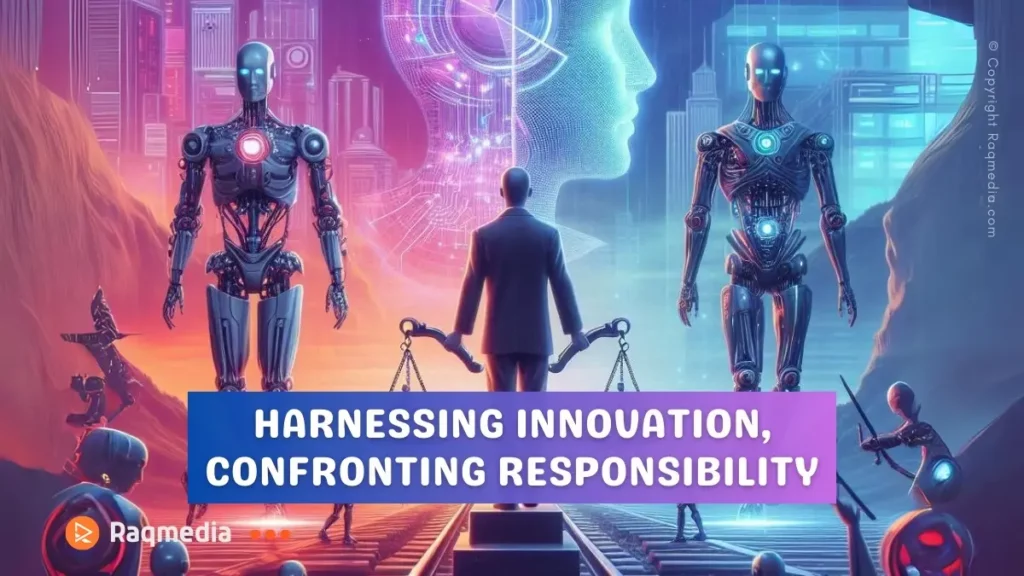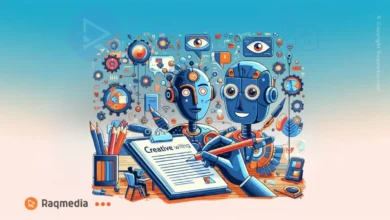In the ever-evolving landscape of artificial intelligence, where innovation sparks endless possibilities and breakthroughs, a critical interplay emerges: the delicate dance between progress and responsibility. Picture a realm where algorithms learn and evolve at lightning speed, reshaping industries, revolutionizing healthcare, and redefining how we interact with technology daily.
Yet, beneath the surface of this AI revolution lies a profound ethical undercurrent that demands our attention with urgency. The question arises: How do we strike a harmonious balance between propelling innovation forward while safeguarding against potential pitfalls that may compromise societal well-being?
Harnessing Innovation, Confronting Responsibility: Striking a Balance in AI Evolution
As we navigate the complexities of AI evolution, it becomes increasingly evident that the stakes are high -perhaps higher than ever before in harnessing technological prowess responsibly. In this fast-paced world of algorithms and automation, where decisions once reserved for human judgment are now entrusted to machine learning systems, the dual imperative of driving progress while upholding ethical values takes center stage.

This is not merely a theoretical quandary but an urgent call to action for tech professionals, policymakers, ethicists, and entrepreneurs alike to steer the course towards a future where innovation thrives hand in hand with ethical considerations. So let us embark on a journey through the corridors of AI ethics – exploring practical insights and real-world implications – to unravel the intricate tapestry woven by balancing innovation with responsibility in the captivating realm of artificial intelligence evolution.
Understanding AI Innovation
Artificial intelligence (AI) innovation stands at the forefront of technological progress, showcasing remarkable advancements that have permeated diverse sectors with transformative capabilities. From revolutionizing healthcare diagnosis to enhancing financial forecasting accuracy, AI's impact reverberates across industries, offering new solutions to age-old problems.
In healthcare, AI-driven diagnostic tools sift through vast datasets with unmatched speed and precision, aiding doctors in early disease detection and treatment optimization. This convergence of technology and medicine holds promise for improved patient outcomes and streamlined healthcare delivery, showcasing just a glimpse of AI's potential societal benefits.
In the realm of finance, AI algorithms analyze complex market trends swiftly and accurately, empowering investors with data-driven insights for strategic decision-making. By automating tedious tasks like risk assessment and portfolio management, AI streamlines financial processes while reducing human error rates. Moreover, in sectors such as transportation and retail, AI-driven innovations are reshaping customer experiences through personalized recommendations and efficient service deliveries. The integration of AI technologies not only enhances operational efficiency but also fosters creativity in addressing evolving consumer needs.
The AI Ethical Implications
While the benefits of AI innovation are undeniable, there exists a pressing need to navigate the ethical implications that accompany these advancements. As society grapples with the integration of autonomous systems into daily life and work practices, ensuring responsible deployment becomes paramount. Striking a balance between harnessing the potential of AI for progress while confronting the responsibilities it entails is crucial for shaping an inclusive future driven by innovation tempered with ethical considerations.
Prevalence Of Bias In Algorithms
Ethical considerations in AI development are becoming increasingly paramount as technology advances at a rapid pace. One significant challenge is the prevalence of bias in algorithms, which can perpetuate and even amplify societal inequalities. For example, a study conducted by MIT researchers revealed that facial recognition algorithms from major tech companies exhibited gender and racial biases, leading to misidentifications and reinforcing stereotypes. Such biases not only undermine the accuracy and fairness of AI systems but also have real-world implications for individuals subjected to discriminatory outcomes.
Privacy Concerns
Privacy concerns constitute another critical ethical dilemma in AI development. The collection and utilization of vast amounts of personal data to train AI models raise questions about consent, surveillance, and data security. The Cambridge Analytica scandal serves as a vivid illustration of the potential misuse of personal information for targeted political campaigns without users' knowledge or consent. This breach not only violated privacy rights on a massive scale but also highlighted the need for stringent regulations to safeguard individuals' data in an era where AI-driven technologies permeate various aspects of daily life.
Examples Of Ethical Lapses In AI Deployment
Real-world examples of ethical lapses in AI deployment further underscore the significance of addressing ethical considerations proactively. Instances like the Uber self-driving car accident in 2018, where a pedestrian was fatally struck while crossing the road, illuminated the complexities surrounding liability, safety protocols, and accountability in autonomous technologies. These incidents serve as stark reminders that innovation must be coupled with ethical foresight to prevent harm and enhance societal trust in AI systems. Ethical introspection and responsible decision-making become imperative as we navigate the evolving landscape of artificial intelligence with its profound implications for individuals and communities alike.
Regulatory Oversight
Regulatory oversight plays a crucial role in shaping the ethical framework within which artificial intelligence (AI) technologies operate globally. In the realm of AI, where innovation often outpaces regulation, policymakers and regulators face the challenging task of keeping up with rapidly evolving technologies to safeguard against potential risks and ensure ethically sound practices. Various jurisdictions have taken distinct approaches to AI regulation, reflecting their unique societal values and priorities.
One key tip for navigating the complex landscape of AI innovation and ethics is to prioritize transparency at every stage of development. By openly communicating about the algorithms, data sources, and decision-making processes behind AI systems, companies can build trust with users and stakeholders. For instance, when developing AI-driven healthcare solutions, disclosing how patient data is used and safeguarded can enhance accountability and promote ethical standards within the industry.
For instance, the European Union's General Data Protection Regulation (GDPR) serves as a prominent example of regulatory measures aimed at protecting individual data privacy rights in an increasingly digitized world. The GDPR imposes strict requirements on companies utilizing AI algorithms to process personal data, emphasizing transparency, accountability, and user consent. By mandating stringent data protection standards, the GDPR seeks to uphold ethical principles while fostering innovation in AI applications.

In contrast, countries like China have embraced a more flexible regulatory stance toward AI development, prioritizing technological advancement and economic growth. While this approach has spurred rapid innovation in areas like facial recognition technology and smart cities, concerns have arisen about the potential trade-offs between unchecked technological progress and ethical considerations such as citizen privacy rights. Policymakers in these contexts are tasked with striking a delicate balance between promoting AI innovation and safeguarding ethical norms within society.
Ultimately, navigating the complex regulatory landscape for AI requires a collaborative effort among stakeholders including policymakers, industry leaders, ethicists, and technologists. By fostering dialogue and collaboration across these domains, regulatory frameworks can be designed that not only mitigate risks associated with AI deployment but also ensure that innovation aligns with ethical principles essential for building trust in AI systems. As the global community grapples with the responsible advancement of AI technologies, achieving a harmonious balance between innovation and ethics remains paramount for sustainable progress in this transformative field.
Strategies for Balancing Innovation and Ethics
In the fast-paced world of AI development, finding the delicate equilibrium between innovation and ethics is crucial. Tech professionals are encouraged to embed ethical principles within the DNA of their AI projects from inception to deployment. Integrating tools like Ethical Impact Assessments can help teams identify potential ethical pitfalls early on, paving the way for ethically sound solutions. For instance, Google's Responsible AI Practices have been instrumental in guiding their teams to consider fairness, privacy, and accountability throughout product design phases.
Moreover, fostering interdisciplinary collaborations among technologists, ethicists, and policymakers serves as a linchpin in promoting responsible AI advancement. Bringing diverse perspectives to the table can uncover blind spots in algorithmic decision-making frameworks that might perpetuate bias or discrimination. The Harvard Data Science Review's model exemplifies this synergy by convening experts across disciplines to address societal impacts of data science and AI technologies comprehensively.
By prioritizing transparency and open dialogues between stakeholders, tech professionals can proactively navigate the ethical terrain of AI innovation. Recognizing that ethical considerations are not mere add-ons but intrinsic to sustainable progress will steer the AI industry towards a future where innovation thrives hand-in-hand with responsibility.
Navigating Challenges in AI Evolution
In the dynamic landscape of artificial intelligence (AI), entrepreneurs and industry leaders encounter a myriad of challenges as they strive to balance innovation with ethical responsibilities. One common dilemma is the inherent bias that can infiltrate AI algorithms, shaping decisions and outcomes in ways that perpetuate discrimination. For instance, facial recognition software has drawn criticism for exhibiting racial biases, leading to misidentifications that have serious real-world consequences. Addressing these biases while advancing innovation poses a significant challenge that demands a nuanced approach from tech professionals and policymakers.
Moreover, privacy concerns loom large in the realm of AI evolution. As companies collect vast amounts of data to fuel their algorithms and enhance user experiences, questions surrounding data protection and individual liberties become paramount. The Cambridge Analytica scandal serves as a stark reminder of the ethical pitfalls surrounding data usage in AI applications, highlighting the pressing need for robust privacy safeguards. Navigating this intricate terrain requires a delicate balance between leveraging data for innovation and safeguarding user rights—a tightrope walk that demands strategic foresight and clear ethical frameworks.
Another critical challenge lies in ensuring transparency and accountability in AI decision-making processes. As machine learning systems grow increasingly complex, understanding how AI arrives at its conclusions becomes more challenging, raising concerns about accountability when errors or biases surface. Explaining these black-box algorithms to non-technical stakeholders poses a formidable obstacle for industry leaders seeking trust and buy-in from diverse stakeholders. Tackling this challenge demands clear communication strategies, interdisciplinary collaborations, and unwavering commitment to ethical best practices to navigate the complexities of AI evolution successfully.

The future of ethical AI stands at a critical juncture, with industry leaders and policymakers increasingly recognizing the significance of integrating ethics into artificial intelligence development. As we navigate the evolving landscape of AI technology, one of the key trends shaping the future is the rise of interdisciplinary collaborations. By fostering partnerships between technologists, ethicists, and policymakers, organizations can ensure that ethical principles are woven into the fabric of AI innovation from its inception. This collaborative approach not only enhances transparency and accountability but also serves as a safeguard against potential ethical pitfalls in AI applications.
Another crucial strategy is to incorporate ethical impact assessments into the design and deployment of AI technologies. These assessments involve systematically evaluating the potential risks and benefits of AI applications on individuals and society. By proactively identifying ethical considerations early on, developers can address biases in algorithms or privacy implications before they escalate into larger societal issues. For example, conducting impact assessments for autonomous vehicles can ensure that safety concerns are addressed alongside technological advancements.
Moreover, the future holds promise for advancements in explainable AI (XAI) technologies. Explainable AI aims to demystify complex machine learning algorithms, offering insights into how AI systems arrive at their decisions. By enhancing interpretability and transparency in AI models, stakeholders can better understand the reasoning behind AI-generated outcomes, thus mitigating biases and promoting fairness. Integrating XAI capabilities represents a significant step towards building trust in AI systems and aligning them with ethical standards.
Furthermore, as ethical considerations continue to gain traction in AI discourse, we can anticipate a paradigm shift towards value-driven innovation. Organizations are recognizing that sustainable growth in the AI sector necessitates a steadfast commitment to upholding societal values and respecting user privacy rights. By prioritizing ethics alongside technological advancements, companies can cultivate long-term relationships with consumers based on trust and integrity. The emerging trend of embedding ethical frameworks within AI development processes signifies a holistic approach towards building responsible and human-centric artificial intelligence solutions for the future.
Striking a Harmonious Balance
As we peer into the future of artificial intelligence (AI) development, it becomes increasingly evident that navigating the intricate interplay between innovation and ethics is essential for fostering a sustainable AI ecosystem. The foundation of ethical AI practices must be laid today to ensure a tomorrow where technological advancement aligns harmoniously with moral values. By summarizing the learnings from past ethical breaches and leveraging them to inform future decisions, tech pioneers can steer AI evolution towards a more equitable and responsible path.
The imperative of upholding ethical values alongside technological progress cannot be overstated in the context of AI innovation. Through transparent governance structures, robust privacy measures, and proactive consideration of biases in algorithms, stakeholders stand poised to shape a future where AI not only thrives but also serves as a force for societal good. Only by striking a harmonious balance between pushing boundaries in innovation and respecting ethical guardrails can we collectively harness the full potential of artificial intelligence while safeguarding against unintended consequences.
In this era of rapid technological transformation, the call for responsible AI development echoes louder than ever. The onus lies on industry leaders, policymakers, ethicists, and innovators alike to collaborate effectively in weaving an ethical fabric around AI solutions. By prioritizing conscientious decision-making at every stage of development and deployment, we can pave the way for an AI landscape that promotes inclusivity, fairness, and trust.
As we embark on this journey towards realizing the promises of AI while confronting its responsibilities head-on, let us remember that true progress stems from our ability to tread cautiously yet boldly in equal measure.
To strike a harmonious balance between innovation and ethics in AI evolution, fostering interdisciplinary collaboration is essential. Bringing together technologists, ethicists, policymakers, and other stakeholders enables diverse perspectives to shape responsible decision-making in AI development. By creating forums for cross-disciplinary dialogue and knowledge exchange, innovative solutions that uphold ethical values while driving technological progress can emerge. An exemplary case could involve collaborative efforts among researchers, regulators, and tech companies to establish guidelines for the ethical use of facial recognition technology in public spaces.
By following these tips—embracing transparency, implementing ethical impact assessments, and fostering interdisciplinary collaboration—those involved in AI innovation can navigate ethical challenges effectively while harnessing the full potential of artificial intelligence for societal good.
Striking A Balance in AI Evolution: Embracing Responsibility in AI
As we navigate the intricate terrain of AI evolution, it becomes evident that the harmony between innovation and ethics is not just a desirable goal but an essential prerequisite for sustainable progress. In embracing responsibility alongside technological advancement, we pave the way for a future where AI enhances human well-being without compromising fundamental values. The journey ahead requires a collective commitment from tech professionals, policymakers, ethicists, and entrepreneurs to shape AI development ethically and purposefully.
By striking this harmonious balance, we can harness the full potential of artificial intelligence while safeguarding against unintended consequences. As we stand at the crossroads of innovation and ethical considerations, our choices today will echo in shaping the trajectory of AI evolution tomorrow. Let us forge ahead with vigilance and compassion, knowing that the road to responsible AI is both challenging and rewarding.
FAQs:
1. What are some common ethical dilemmas of balance in AI evolution?
– Ethical dilemmas in AI range from biases in algorithms to privacy concerns and decisions about autonomous system interactions with humans.
2. How can tech professionals integrate ethical considerations into AI innovation processes?
– Tech professionals can embrace transparency, diversity in teams, ethical design frameworks, and ongoing ethical assessments to integrate ethics into their work effectively.
3. What role do policymakers play in ensuring responsible AI development?
– Policymakers craft regulations to enforce ethical standards on data use, privacy protection, algorithm accountability, fair competition practices, and more within the AI landscape.
4. Why is interdisciplinary collaboration crucial for fostering ethical AI development?
– Collaborations among technologists, ethicists, policymakers, and other stakeholders ensure a holistic approach to address multifaceted ethical challenges embedded in complex technologies like AI.
5. What does the future hold for ethical considerations in artificial intelligence?
– The future points toward an increased emphasis on ethics as integral to sustainable AI advancement through evolving regulations, growing public awareness of ethical issues, and advancing technologies like explainable AI.
In Short:
Striking a balance in AI evolution with ethics in the realm of artificial intelligence signifies more than just a prudent choice—it embodies our commitment to integrity, empathy towards societal implications of technology deployment decisions. It underscores our duty to uphold moral principles amid rapid technological transformations that define our era's evolution.
As we venture forward into uncharted territories of artificial intelligence advancement, let us carry forward this ethos—a guiding beacon illuminating our path towards an equitable and humane future shaped by responsible innovation.










Striking a Balance in AI Evolution: Uncover the delicate equilibrium between progress and ethical considerations in AI advancement.